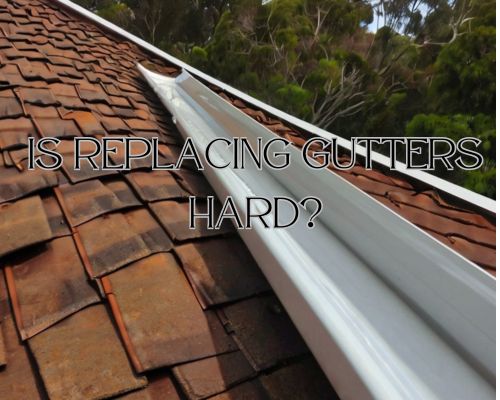Living in Florida means dealing with frequent and heavy rainfall, which makes choosing the right gutters for your home essential.

Seamless aluminum gutters are among the best options for Florida homes due to their durability and resistance to rust.
Ensuring you have high-quality gutters can help protect your roof, foundation, and landscaping from water damage.
When selecting gutters, it’s important to consider materials that can withstand Florida’s climate.
Aluminum and galvanized steel are popular choices because they resist corrosion and handle large amounts of water efficiently.
Properly installed gutters, like what Gutters Of West Palm Beach does, prevent water from pooling around your foundation, reducing the risk of damage and maintaining the integrity of your home’s structure.
Besides material, the design and installation of gutters also play crucial roles.
Seamless gutters, which minimize the chances of leaks, are especially beneficial in heavy rain environments.
By investing in the right gutters, you can safeguard your home from the costly effects of water damage and ensure your landscaping remains intact.
Choosing the Right Materials for Florida’s Climate
Given Florida’s unique weather conditions, selecting the right gutter material is critical. The constant rain and high humidity can challenge the durability of various materials, and all options should be considered carefully.
Comparing Durability of Different Gutter Materials
Aluminum gutters are widely favored in Florida. Their corrosion resistance and lightweight nature make them ideal for withstanding constant rain.
They also come in various thicknesses, offering additional strength options without sacrificing ease of installation.
Vinyl gutters, although cost-effective and rust-resistant, can become brittle under intense Florida heat. This makes them less durable in the long term, potentially leading to frequent replacements.
Copper gutters are an aesthetic and durable choice. They resist rust and corrosion but come with a higher initial cost. Their long-lasting nature can offset the initial investment, making them a solid choice for those looking to invest in quality.
Steel gutters, whether galvanized or stainless, offer incredible strength.
Galvanized steel, however, is prone to rust over time, while stainless steel provides durability without rust concerns. Both options are heavier, requiring more robust mounting systems.
Considering the Impact of Florida Weather on Materials
Florida’s weather, characterized by high humidity and frequent rain, can influence gutter material performance.
Materials that are resistant to mold and mildew growth are crucial.
Aluminum and copper excel in these conditions, showing fewer signs of mold or mildew.
Hurricane season poses another challenge.
Strong winds and heavy rain can test gutter systems.
Aluminum and steel gutters offer better wind resistance compared to vinyl, which may not hold up well in storm conditions.
Corrosion is a significant factor.
Humidity accelerates the rusting process in steel, particularly non-stainless varieties.
Aluminum and copper offer better corrosion resistance, crucial for longevity in Florida’s moist environment.
Design and Installation Considerations
When designing and installing gutters in Florida, you’ll need to consider factors like the style and shape, the choice between DIY and professional installation, and the ongoing maintenance required. Each aspect plays a critical role in the system’s performance and longevity.
Examining Styles and Shapes for Functionality and Aesthetics
Choosing the right style and shape for your gutters is crucial for both functionality and aesthetics.
In Florida, where heavy rainfall is common, K-style gutters are a popular choice due to their capacity to handle substantial water flow.
Half-round gutters offer a more traditional appearance and are easier to clean but may not handle heavy rain as effectively.
Box gutters provide a sleek, modern look and can be custom-sized.
The choice of material is equally important, with aluminum and vinyl gutters being the most common.
Vinyl is lightweight and rust-resistant but can become brittle in the Florida heat. Aluminum is more durable and comes in seamless options to minimize leaks.
Professional Vs. DIY Installation
Deciding between professional and DIY installation involves weighing cost, expertise, and time.
Professional installation, like going to Gutters Of West Palm Beach, ensures that gutters are properly fitted and sloped for optimal drainage.
Gutter installers use specialized equipment and can provide seamless gutters, which reduce the risk of leaks.
DIY installation is more budget-friendly and allows for a personalized touch, but it demands precise measurements and tools.
If you’re considering seamless gutter installation, professional services are recommended as they require machinery that most homeowners do not own.
For those looking to save money, sectional gutters are more suited for DIY projects.
Maintenance and Upkeep
Regular maintenance is essential to keep your gutter system functioning properly.
Gutter cleaning is particularly important in Florida due to frequent rain and debris build-up.
Investing in gutter guards can minimize clogging and reduce the frequency of cleanings.
Routine inspections for leaks, sagging, and rust can prevent costly repairs.
For lasting durability, schedule annual check-ups with a trusted gutter company to perform gutter maintenance and minor repairs.
Having your gutters cleaned professionally ensures thoroughness, especially in hard-to-reach areas like downspouts and elbow joints.
Regular upkeep and timely gutter repair will extend the lifespan of your gutters, saving you money and protecting your home from water damage.


